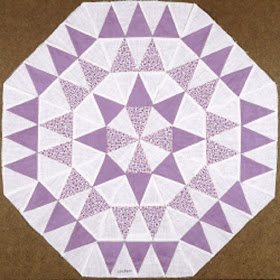Pattern with plenty of potential.
I found this vintage example on Camille's Pinterest Page
As a square block it's BlockBase # 2754, published in Capper's Weekly about 1930 with no name that I've been able to find.
It was in Carrie Hall's book as Spinning Triangles and here's her version
in her block collection at the Spencer Museum of Art. She pieced it as an
octagonal block.
Eight-sided blocks are in BlockBase
as 296----
Again Evening Star from the Kansas City Star.
Evelyne Foland showed it as an octagon in the Kansas City
Star in 1930. She told readers to make an octagonal pillow, which may have
reduced reader frustration levels.
But many stitchers joined the octagonal block with a small square.
The Arizona Project found one made by Mary M. Rinehart.
Here the spacer square is blue.
There seems to be some variety in the number of triangles.
Wonderful mid-century composition: gray spacer squares
with blue triangles to fill out the edges.
I have been tempted to piece this (EPP-style over papers) but
I'd organize the triangles into square blocks with a half-square triangle in the corners.
BlockBase #2736
"Spider Web Gone Awry"???
Great example from about 1875 to 1900
offered by French Antiques on eBay last year.
I was surprised to see the pattern in a quilt this old...
Once I started looking I found another earlier version of #2736,
this one from about 1900 in the Quilt Index,
courtesy of the Rhode Island Project. The variegated color
certainly has some appeal.
Sashing changes the focus.
I have learned the hard way (all geometry is learned the hard way for me) that the basic triangle is NOT an equilateral triangle. It is a tall triangle, which repeats into a tall triangle.
If you begin with an equilateral triangle the block becomes a hexagon,
Hexstatic by Ali Winston
NOT an octagon.
(In the current age of lies I am totally denying that I ever made this mistake.)
Print this out and you should have a triangle 3" tall.
An isoceles triangle. Use a half-square triangle as the second piece in the corners.
Katie Clarke Blakesly shows you the basics of piecing a simple block here:
Two contemporary color variations by Joyce Gieszler who
calls it Grandma's Surprise.
And here's a page of isoceles triangles at Paper Pieces:
https://www.paperpieces.com/search/?q=isoceles
https://www.paperpieces.com/search/?q=isoceles























No comments:
Post a Comment